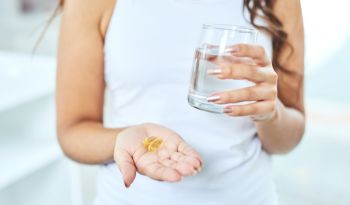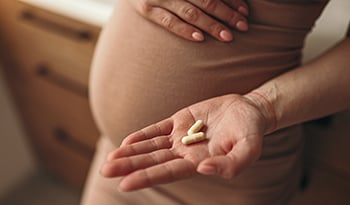Perimenopause: Almindelige symptomer + 10 bedste kosttilskud
Perimenopause er begyndelsen på overgangen til overgangsalderen. Det kan starte i midten af trediverne og vare mellem to til 10 år. Cirka 85% af kvinderne oplever fysiske og følelsesmæssige symptomer udløst af ændringerne i hormonniveauer forbundet med perimenopause.1
Heldigvis er der mange ting, du kan gøre for at føle dig bedre og forblive sund, fra at træne regelmæssigt og spise en anti-inflammatorisk diæt til smarte tilskud. Læs videre for at lære om nogle af de bedste kosttilskud til overgangsalderen, der kan give naturlig lindring af perimenopause.
Hvad er perimenopause?
Perimenopause er tiden op til overgangsalderen, hvor æggestokkene begynder at lukke ned og hormonniveauet falder. Mens mange mennesker bruger udtrykket „overgangsalder“ til at henvise til den sæson i livet, hvor du begynder at opleve menopausale symptomer som hedeture, defineres overgangsalderen som det tidspunkt, hvor du ikke har haft en periode i 12 på hinanden følgende måneder. Grundlæggende stopper din menstruation - hvilket giver mening, da udtrykket „overgangsalder“ kommer fra de græske ord pausis for pause og mænd i en måned.
Omkring 46,5 millioner kvinder verden over og 1,3 millioner i USA når overgangsalderen hvert år. De fleste amerikanske kvinder ramte milepælen i overgangsalderen mellem 45 og 56 år, hvor gennemsnittet er 51.
Der er ingen endelig test til at afgøre, om du er i perimenopause. Du kan få en blodprøve for at måle niveauer af follikelstimulerende hormon (FSH) og østradiol, en form for østrogen. En over-the-counter urintest er også tilgængelig for FSH. Men da niveauerne af FSH og østrogen svinger meget med din menstruationscyklus, er det svært at afgøre med sikkerhed, om du er i perimenopause ud fra resultaterne.
De fleste kvinder kan selv diagnosticere perimenopause på grund af almindelige symptomer og uregelmæssige perioder. Andre diskuterer symptomer med deres læger, hvorfor det er vigtigt at arbejde med læger, der forstår perimenopause og vil lytte til dig.
Almindelige symptomer på perimenopause
Alle oplever perimenopause forskelligt. De mest almindelige symptomer er vasomotorisk, som er relateret til indsnævring eller udvidelse af blodkar. Disse omfatter hedeture og nattesved. Ifølge National Menopause Foundation oplever 75% af kvinderne hedeture i overgangsalderen. 2
Almindelige symptomer på perimenopause omfatter:3
- Hetetokter
- Natsved
- Humørsvingninger
- Hjernetåge
- Hårtab
- Søvnproblemer
- Lav libido
- Vaginitis
- Hovedpine
- Depression
- Ledsmerter
- Osteoporose
- Vægtøgning
Når du går over gennem overgangsalderen, er det vigtigt at vide, at når hormonniveauerne falder, øges risikoen for hjertesygdomme, muskeltab og knogletab. Det skyldes, at østrogen hjælper med at beskytte muskler, knogler og det kardiovaskulære system.
Kosttilskud til perimenopause
Sammen med at nyde en sund livsstil kan indtagelse af kosttilskud til perimenopause hjælpe naturligt med at lindre symptomer og optimere trivsel, så du nyder de næste årtier af dit liv.
Calcium
Kvinder mister i gennemsnit 1% af deres knoglemineraltæthed hvert år efter overgangsalderen.4 Så det er vigtigt at forhindre knogletab fra perimenopause. Forbrug af nok calcium, det mest rigelige mineral i kroppen, kan hjælpe med at opretholde knogletætheden og reducere risikoen for osteoporose og brud.
Forskning viser, at tilskud kan hjælpe med at bevare knogler. En undersøgelse af næsten 1.500 postmenopausale kvinder, der fik 1.000 milligram calciumcitrattilskud eller placebo dagligt, viste, at calciumtilskud gavnede knogletætheden betydeligt.5
Calcium er også involveret i muskelsammentrækning, herunder sammentrækning af hjertet, hvilket betyder, at det kan hjælpe med at understøtte hjerte-kar-sundhed.6 En undersøgelse af over 34.000 kvinder tyder på, at indtagelse af mere calcium fra kost, kosttilskud eller en kombination af kost og kosttilskud er forbundet med en reduceret risiko for koronar hjertesygdomsdødelighed hos postmenopausale kvinder.7
Efter 50 år stiger RDA for calcium med 200 milligram om dagen fra 1.000 til 1.200 milligram. Fødevarekilder inkluderer mejeriprodukter, fisk med knogler, såsom dåse sardiner og laks, tofu og sojabønner, nogle grønne grøntsager som grønkål og broccoli og berigede fødevarer.
Som supplement er calcium tilgængeligt alene, i kombination med D-vitamin eller andre mineraler som zink og magnesiumog i multivitamin-mineralformler. De to hovedformer for calciumtilskud er calciumcarbonat og calciumcitrat. Calciumcarbonat bør tages sammen med mad. Calciumcitrat, som findes i receptfrie antacida, kan tages sammen med mad eller på tom mave. Kroppen kan kun bruge en begrænset mængde calcium ad gangen, så det er smart at opdele dosis og tage noget om natten, hvilket er det bedste tidspunkt for knogleresorption.
Magnesium
Magnesium er involveret i adskillige biokemiske reaktioner og understøtter knogle- og hjertesundhed, hormonniveauer og nervesystemet. Dette essentielle mineral kan hjælpe med at lindre mange perimenopausale symptomer og potentielle sundhedsproblemer, herunder:
- Ledsmerter
- Hetetokter
- Vægtøgning
- Dårligt humør
- Osteoporose
- Hjertesygdom
- Søvnløshed
Problemer med at sove? Magnesium kan hjælpe med at regulere dine døgnrytmer og hjælpe dig med at slappe af. Et randomiseret klinisk forsøg viste, at 500 milligram magnesiumtilskud i otte uger signifikant forbedrede søvntid og kvalitet hos ældre voksne.8
Magnesium kan også forbedre din mentale sundhed gennem dets involvering i stressresponsen, humørregulering og hvordan hjernen fungerer. Flere undersøgelser har forbundet lavt kostindtag og blodniveauer af magnesium med højere frekvenser af depression.9
Østrogen reducerer inflammation og smører leddene. Så da østrogenniveauerne falder under perimenopause, kan smerten øges. Forskere mener, at faldet i østrogen kan forårsage betændelse ved at reducere mængden af magnesium i nerveceller. Så at øge dit indtag af magnesium kan hjælpe med at reducere smerter. Et dyreforsøg viste, at magnesiumtilskud forhindrede eller vendte kroniske smerter, depressionslignende adfærd og dårlig hukommelse hos hunmus, der var ældre eller ikke havde æggestokke.10
Ligesom calcium og D-vitamin er magnesium afgørende for knoglesundheden. Det påvirker knoglen direkte ved at påvirke dannelsen af knogleceller og indirekte ved at påvirke udskillelsen af parathyreoideahormon, som stimulerer knogleombygning. Resultater fra studier på mennesker og dyr tyder på, at magnesiummangel bidrager til osteoporose.11
En anslået halvdel af kvinderne får ikke de anbefalede 310 til 320 milligram magnesium dagligt. Fødevarer rige på magnesium inkluderer nødder, frø og bønner. At tage et magnesiumtilskud enten alene, i kombination med andre mineraler som calcium eller som en del af en multivitamin-mineralformel er en nem måde at øge dit indtag på.
Der er fire forskellige former for magnesium. Denne artikel kan hjælpe dig med at bestemme, hvilken form der er bedst for dig.
D-vitamin
Et af de vigtigste vitaminer til perimenopause er vitamin D. Ligesom vitaminerne A, Eog Ker D-vitamin et fedtopløseligt vitamin. Din hud producerer D-vitamin fra sollys, og du kan også indtage det i fødevarer og som et supplement. Det anslås, at halvdelen af kvinder i midten af livet mangler D-vitamin12
Manglende D-vitamin kan øge risikoen for hedeture. En undersøgelse af 210 postmenopausale kvinder konkluderede, at fald i D-vitaminniveauer var signifikant forbundet med hedeture.13
D-vitamin er også vigtigt for knoglesundheden, fordi det spiller en nøglerolle i knoglemineralisering og påvirker mængden af calcium og fosfor, som kroppen optager og bevarer. En metaanalyse af et dusin randomiserede kontrollerede forsøg konkluderede, at indtagelse af omkring 500 til 800 internationale enheder (IE) af D-vitamin dagligt reducerede hofte- og ikke-rygfrakturer med ca. 20% hos mennesker over 65 år.
At få nok D kan også hjælpe med at vende vægtøgning i overgangsalderen. Et randomiseret kontrolleret forsøg, der undersøgte seks ugers vitamin D-tilskud hos yngre overvægtige og overvægtige kvinder, fandt en signifikant reduktion i vægt, taljeomkreds og kropsmasseindeks sammenlignet med kontroller.15
D-vitamin kan også hjælpe med at øge muskelstyrke og masse. En undersøgelse konkluderede, at D-vitaminmangel øger risikoen for at miste muskelstyrke med 78%.16
D-vitamintilskud fås som ergocalciferol (vitamin D2), der kommer fra planter, og cholecalciferol (vitamin D3), som kommer fra animalske fødevarer. Forskning viser, at D3 kan være et bedre valg, fordi det øger blodniveauet mere og længere end D2.17
RDA for D-vitamin for voksne under 70 år er 600 IU'er. Den sikre øvre tolerable grænse for D-vitamin er 2000 IE pr. Dag. Mangelfulde kvinder, som kan påvises ved en blodprøve, kan have brug for mere. Hvis du er bekymret for, at du mangler D-vitamin, skal du tale med din læge og blive testet for at bestemme den rigtige dosis.
Omega-3 fedtsyrer
Omega-3 fedtsyrer- kort sagt omega-3'er - er sunde fedtstoffer, der er et godt naturligt supplement til perimenopause. De hjælper alle kroppens celler med at fungere korrekt og understøtter mental sundhed, det kardiovaskulære system og det endokrine system.
De tre hovedtyper af omega-3 er:
- EPA (eicosapentaensyre): findes i fed fisk og fiskeolie
- DHA (docosahexaensyre): findes i fed fisk og fiskeolie
- ALA (alfa-linolensyre): findes i planter som valnødder, hørfrø, hampfrøog chiafrø
Kvinder i midten af livet har den højeste grad af depression for enhver gruppe efter alder og køn, og omega-3'er kan hjælpe ved at forbedre hjernens struktur. Forskning på postmenopausale kvinder viser, at høje indtag af omega-3'er er signifikant forbundet med lavere frekvenser af depression.18
Indtagelse af omega-3'er kan også hjælpe med at reducere hedeture. En undersøgelse af 20 peri- og postmenopausale kvinder med alvorlig depressiv lidelse relateret til overgangsalderen fandt, at tilskud med 2 gram omega-3-fedtsyrer i otte uger reducerede depressive symptomer og hedeture uden bivirkninger.
Omega-3'er kan understøtte hjertesundheden ved at reducere blodtryk, triglyceridniveauer og LDL „dårligt“ kolesterol og øge HDL „godt“ kolesterol. Omega-3 fedtsyrer kan også lindre andre menopausale klager, herunder ledsmerter, knogletab, menstruationskramper og vaginal tørhed. De er stærke til at lindre smerter, fordi de sænker produktionen af prostaglandiner, som forårsager betændelse.
Fiskeolie, en kilde til omega-3'er, kan også hjælpe dig med at tabe dig ved at bremse sult og appetit, øge stofskiftet og reducere mavefedt. En undersøgelse af ældre kvinder mellem 60 og 70 år, der tog 3 gram fiskeolie eller placebo dagligt i 12 uger, fandt, at fiskeolietilskud signifikant øgede hvilemetabolismen med 14%, sænkede triglyceridniveauet med 29% og øgede mager kropsmasse med 4%.19
Selvom der ikke er etableret nogen RDA for omega-3 fedtsyrer, har FDA sat et passende indtag for voksne kvinder til 1,1 gram pr. dag. FDA har konkluderet, at kosttilskud, der ikke giver mere end 5 gram EPA og DHA om dagen, er sikre, når de anvendes som anvist.20
Sojaisoflavoner
I Fjernøsten Asien har kvinder meget lavere forekomst af menopausale symptomer som hedeture. Anslået 10 til 20% af kvinderne fra Fjernøsten Asien, hvor soja er en fast bestanddel i kosten, oplever hedeture.
Soja indeholder isoflavoner, plantekemikalier svarende til østrogen produceret af kroppen. I gennemsnit har kvinder i Fjernøsten Asien, der spiser soja regelmæssigt, ca. 12 gange højere blodkoncentration af isoflavon genistein end kvinder i USA.
En undersøgelse af 100 perimenopausale og postmenopausale kvinder viste statistisk signifikante reduktioner i hedeture, ubehag i hjertet, ubehag i led og muskler og søvnproblemer efter 12 uger med sojaisoflavontilskud. Resultaterne var stærkere for de perimenopausale kvinder.21
Yderligere undersøgelser har fundet, at sojaisoflavoner også kan øge knoglemineraltætheden, reducere risikoen for hjertesygdomme ved at sænke niveauerne af LDL „dårligt“ kolesterol og lindre symptomer på slidgigt.
Fibre
Fiber, den del af plantefødevarer, som vi ikke fordøjer, kan hjælpe med at sænke kolesterolniveauet, styre blodsukkeret, understøtte en sund kropsvægt, kontrollere appetitten, reducere depression og hjælpe med hedeture.
Forstoppelse kan blive et problem under perimenopause, fordi ændringer i hormonniveauer kan bremse, hvor hurtigt mad bevæger sig gennem din tarm. Fiber hjælper med at holde dig regelmæssig.
Fiber er også et præbiotisk middel. Prebiotika fodrer mikroorganismerne i din mave-tarmkanal og skaber et sundere mikrobiom (økosystemet af mikroorganismer, der lever i din fordøjelseskanal). Dette er vigtigt, fordi østrogen spiller en positiv rolle i reguleringen af tarmmikrobiomet. Når østrogenniveauerne falder, gør mikroorganismediversiteten det også. At spise mere fiber kan øge antallet og typerne af bakterier, hvilket hjælper med at holde din tarm sund.
Efterhånden som niveauerne af kønshormoner falder, kan kroppens celler blive mere insulinresistente. Som et resultat kan kvinder opleve blodsukkerstigninger, hvilket kan udløse hedeture. Fiber bremser fordøjelsen, hjælper med at stabilisere blodsukkeret og forhindre hedeture.
Overraskende nok kan fiber også hjælpe med at reducere depression. En undersøgelse af 3.054 præmenopausale kvinder i midten af livet fandt, at kostfiberindtag var omvendt forbundet med depressive symptomer - jo mere fiber kvinder spiste, jo mindre sandsynligt var det, at de havde symptomer på depression.22
Der er et stort fiberhul! Kun en ud af 20 mennesker spiser den anbefalede mængde fiber - 25 gram for kvinder og 38 for mænd. Fødevarer med højt fiberindhold inkluderer bønner, frugt, grøntsager, fuldkorn, nødder og frø.
Hvis din kost er lav i fiber, kan et supplement hjælpe dig med at øge dit indtag. Der er en bred vifte af fibertilskud, herunder pulvere, gummier og kapsler. Det er smart at introducere fiber langsomt, så din krop kan vænne sig til det, især hvis du oplever gas eller oppustethed.
Maca
Kendt som peruviansk ginseng, er maca en kraftfuld superfood, der indeholder mange vitaminer og mineraler, herunder C-vitamin, calcium og jern. Det er blevet brugt til at forbedre sundhed, energiniveauer og humør i århundreder. For perimenopausale kvinder kan maca hjælpe med at forbedre kognition og reducere træthed, lav libido og vaginal tørhed.
En undersøgelse af 20 kvinder i tidlig postmenopausen viste, at indtagelse af 2 milligram maca rod signifikant øgede østrogen- og progesteronniveauet sammenlignet med kontroller. Kvinderne i undersøgelsen oplevede også væsentligt reducerede følelser af ubehag forbundet med overgangsalderen.23 En systematisk gennemgang af maca til behandling af menopausale symptomer fandt også gunstige virkninger.24
Det er nemt at supplere din kost med maca. Superfood fås som et pulver, der kan tilsættes smoothies eller yoghurt, som kapsler og som en te.
Melatonin
Melatonin er et hormon, der hjælper med at regulere døgnets søvn/vågningscyklus. Det er også tilgængeligt som et sikkert supplement taget for at forbedre søvn. Melatonin udskilles af pinealkirtlen om natten, når det bliver mørkt. Ligesom kønshormoner falder melatonin også med alderen - især under perimenopause.
En gennemgang af virkningen af melatonin på menopausale kvinders sundhed viste, at doser på mere end 3 milligram forbedrede almindelige menopausale symptomer som hedeture, søvnløshed, humørsvingninger, muskel- og ledsmerter og seksuelle lidelser. Den samme undersøgelse viste, at kvinder med søvnproblemer, der tog melatonin, oplevede bedre søvnkvalitet.25
Melatonin kan også påvirke knogletæthed og styrke positivt. En undersøgelse af perimenopausale kvinder, der tog 3 milligram melatonin om natten i seks måneder, fandt, at melatonintilskud var godt tolereret, forbedrede perimenopausesymptomer og kan hjælpe med at forhindre knogletab.26
Sort Cohosh
Black Cohosh er et populært kvinders sundhedstilskud , der oprindeligt blev brugt medicinsk af indianere. Lavet af en blomstrende plante hjemmehørende i Nordamerika, kan den lindre flere perimenopausale symptomer, herunder hedeture, angst, depression og seksuel dysfunktion.
Et randomiseret kontrolleret forsøg med tidlige postmenopausale kvinder fandt, at indtagelse af 6,5 mg sort cohosh-rodekstrakt dagligt i otte uger forbedrede menopausale symptomer signifikant sammenlignet med kontroller uden rapporterede bivirkninger.27 En yderligere undersøgelse af postmenopausale kvinder med hedeture viste, at sort cohosh reducerede sværhedsgraden og antallet af hedeture, forbedrede livskvaliteten og var mere effektiv end primroseolie, et andet almindeligt anvendt supplement til perimenopause.28
The Spanish Menopause Society konkluderede, at „sort cohosh er en effektiv og sikker behandlingsmulighed til lindring af vasomotoriske symptomer.“29
Sort cohosh kan tages som en kapsel, ekstrakt eller te. Det fås også blandet med andre ingredienser som rødkløver, perikon og sojaisoflavoner. Den mest almindelige dosis til signifikant reduktion af hedeture er 40 milligram dagligt.
Takeaway
De fleste kvinder vil opleve symptomer udløst af hormonændringer, der opstår under perimenopause. At tage støttende kosttilskud i løbet af denne overgangstid kan hjælpe dig med at føle dig bedre, lette symptomer og holde dine knogler stærke og din krop sund.
Mens du kan tage individuelle kosttilskud som calcium, D-vitamin, magnesium, maca, melatonin og sort cohosh, indeholder mange perimenopause-specifikke kosttilskud kombinationer af ingredienser, der virker synergistisk for at hjælpe med at lindre symptomer på overgangsalderen. Fra perimenopause-formler rettet mod mindskende hedeture til dem, der sigter mod at forbedre søvn til generelle perimenopause-specifikke multivitamin-mineralformler, der inkluderer sojaisoflavoner, skal du kigge efter et supplement, der indeholder de nøglekomponenter, der er diskuteret ovenfor for at understøtte dit velvære.
Det er altid klogt at tale med din læge eller registreret diætist, før du starter nye kosttilskud til perimenopause for at være sikker på, at de passer til dig og ikke interagerer med medicin, du tager.
Referencer:
- Introduktion - Menopausale symptomer: Sammenlignende effektivitet af terapier - NCBI boghylde. Tilgået 21. april 2024.
- Uddannelse - National Menopause Foundation. Tilgået 21. april 2024.
- National Menopause Foundation Overgangsaldersymptomtjekliste - National Menopause Foundation. Tilgået 21. april 2024.
- Tai V, Leung W, Grey A, Reid IR, Bolland MJ. Calciumindtag og knoglemineraltæthed: systematisk gennemgang og metaanalyse. BJ. 2015; 351.
- Reid IR, Mason B, Horne A, m.fl. Randomiseret kontrolleret forsøg med calcium hos raske ældre kvinder. Jeg er J Med. 2006; 119 (9): 777-785.
- Ryczkowska K, Adach W, Janikowski K, Banach M, Bielecka-Dabrowa A. Overgangsalderen og kvinders kardiovaskulære sundhed: er det virkelig et indlysende forhold? Arch Med Sci.2023; 19 (2) :458.
- Bostick RM, Kushi LH, Wu Y, Meyer KA, sælgere TA, Folsom AR. Forholdet mellem indtagelse af calcium, D-vitamin og mejeriprodukter til iskæmisk hjertesygdomsdødelighed blandt postmenopausale kvinder. Am J Epidemiol. 1999; 149 (2): 151-161.
- Abbasi B, Kimiagar M, Sadeghniiat K, Shirazi MM, Hedayati M, Rashidkhani B. Effekten af magnesiumtilskud på primær søvnløshed hos ældre: Et dobbeltblindet placebokontrolleret klinisk forsøg. J Res Med Sci.2012; 17 (12) :1161.
- Tarleton EK, Littenberg B. Magnesiumindtag og depression hos voksne. J Am Board Fam Med. 2015; 28 (2): 249-256.
- Zhang J, Mai CL, Xiong Y, m.fl. Magnesiummangelens årsagsrolle i neuroinflammation, smerteoverfølsomhed og hukommelse/følelsesmæssige underskud hos ovariektomiserede og ældre hunmus. J Inflamm Res. 2021; 14:6633.
- Castiglioni S, Cazzaniga A, Albisetti W, Maier JAM. Magnesium og osteoporose: Nuværende videnstilstand og fremtidige forskningsretninger. Næringsstoffer. 2013; 5 (8): 3022.
- Kaushal MJ, Magon N. D-vitamin midt i livet: Solopgangsvitaminet i livets solnedgang. J Midlife Health. 2012; 3 (2): 97.
- Arslanca T, Korkmaz H, Banu Arslanca S, Pehlivanoğlu B, Celikel Ö. Forholdet mellem D-vitamin og vasomotoriske symptomer i postmenopausal periode. Clin Lab. 2020; 66 (7): 1285-1290.
- Bischoff-Ferrari HA, Willett WC, Wong JB, m.fl. Forebyggelse af ikke-vertebrale frakturer med oral D-vitamin og dosisafhængighed: En metaanalyse af randomiserede kontrollerede forsøg. Arch Intern Med. 2009; 169 (6): 551-561.
- Khosravi ZS, Kafeshani M, Tavasoli P, Zadeh AH, Entezari MH. Effekt af D-vitamintilskud på vægttab, glykæmiske indekser og lipidprofil hos overvægtige og overvægtige kvinder: En klinisk forsøgsundersøgelse. Int J Forrige maj 2018; 9 (1).
- Delinocente MLB, Luiz MM, de Oliveira DC, et al. Er serum 25-hydroxyvitamin D-mangel og insufficiens risikofaktorer for forekomsten af dynapeni? Calcif Tissue Int. 2022; 111 (6): 571-579.
- Tripkovic L, Lambert H, Hart K, m.fl. Sammenligning af vitamin D2 og vitamin D3-tilskud til forhøjelse af serum 25-hydroxyvitamin D-status: En systematisk gennemgang og metaanalyse. Amerikansk tidsskrift for klinisk ernæring. 2012; 95 (6): 1357-1364.
- Chae M, Park K. Forbindelse mellem indtagelse af omega-3 fedtsyrer i kosten og depression hos postmenopausale kvinder. Nutr Res Pract. 2021; 15 (4) :468.
- Logan SL, Spriet LL. Omega-3-fedtsyretilskud i 12 uger øger hvile- og træningsstofskiftet hos sunde ældre kvinder, der bor i samfundet. PLoS One. 2015; 10 (12).
- Omega-3 fedtsyrer - Sundhedsfagligt faktaark. Tilgået 22. april 2024.
- Khapre S, Deshmukh U, Jain S. Virkningen af sojaisoflavontilskud på menopausale symptomer hos perimenopausale og postmenopausale kvinder. J Midtlivssundhed. 2022; 13 (2): 175-184.
- Li D, Tong Y, Li Y. Kostfiber er omvendt forbundet med depressive symptomer hos præmenopausale kvinder. Front Neurosci. 2020; 14.
- Meissner HO, Kapczynski W, Mscisz A, Lutomski J. Anvendelse af gelatiniseret Maca (Lepidium Peruvianum) hos tidlige postmenopausale kvinder. Int J Biomed Sci.2005; 1 (1) :33.
- Lee MS, Shin BC, Yang EJ, Lim HJ, Ernst E. Maca (Lepidium meyenii) til behandling af menopausale symptomer: En systematisk gennemgang. Maturitas. 2011; 70 (3) :227-233.
- Treister-Goltzman Y, Peleg R. Melatonin og sundhed hos kvinder i overgangsalderen: En systematisk gennemgang. J Pineal Res. 2021; 71 (2).
- Kotlarczyk MP, Lassila HC, O'Neil CK, et al. Melatonin osteoporoseforebyggelse studie (MOPS): en randomiseret, dobbeltblind, placebokontrolleret undersøgelse, der undersøger virkningerne af melatonin på knoglesundhed og livskvalitet hos perimenopausale kvinder. J Pineal Res. 2012; 52 (4): 414-426.
- Mohammad-Alizadeh-Charandabi S, Shahnazi M, Nahaee J, Bayatipayan S. Effekt af sort cohosh (Cimicifuga racemosa L.) til behandling af tidlige symptomer på overgangsalderen: et randomiseret klinisk forsøg. Chin Med. 2013; 8 (1) :20.
- Mehrpooya M, Rabiee S, Larki-Harchegani A, et al. En sammenlignende undersøgelse af effekten af „black cohosh“ og „night primrose oil“ på menopausale hedetokter. J Educ Health Promat. 2018; 7 (1): 36-40.
- Castelo-Branco C, Navarro C, Beltran E, Losa F, Camacho M. Black cohosh effekt og sikkerhed for menopausale symptomer. Erklæring fra Spanish Menopause Society. Gynecol Endocrinol. 2022; 38 (5): 379-384.
ANSVARSFRASKRIVELSE: Wellness Hub har ikke til hensigt at stille diagnoser...

















































































 Indholdsfortegnelse
Indholdsfortegnelse














